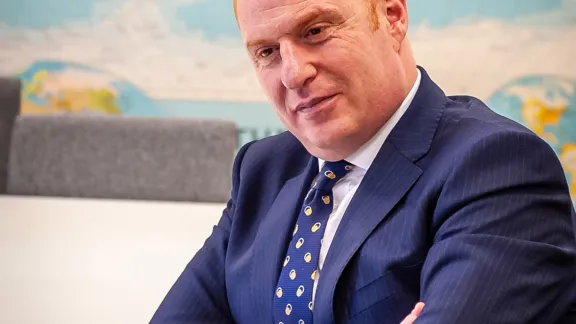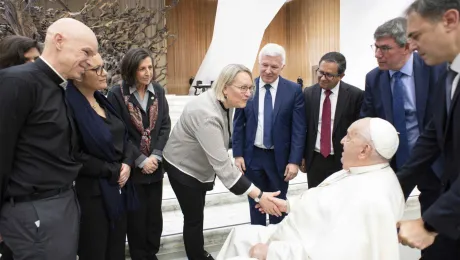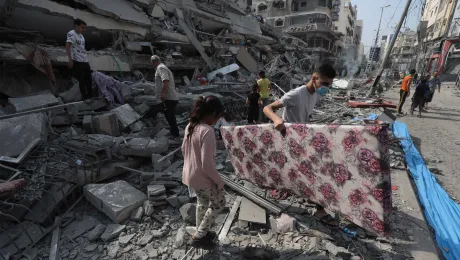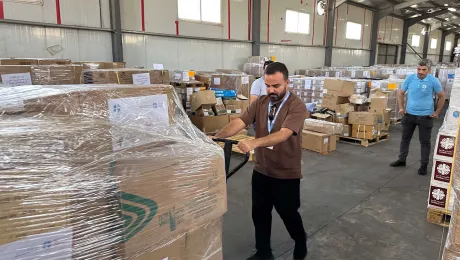Dr Fadi Atrash, CEO of the LWF Augusta Victoria-Hospital in East Jerusalem, has briefed humanitarian staff in different embassies in Geneva on the health care situation in Gaza. After five months of military action, it is “beyond imagination or description,” he says

Dr Fadi Atrash during discussions in Geneva. Photo: LWF/ S. Gallay
Hospitals no longer function, people in Gaza need medical support
(LWI) - The health care system in Gaza has been destroyed, says Dr Fadi Atrash, CEO of the Lutheran World Federation (LWF) Augusta-Victoria-Hospital in East Jerusalem. During a visit to Geneva he met with the humanitarian staff of several missions in Geneva to brief them on the health care situation in Palestine, and advocate for a ceasefire to allow humanitarian aid into the Gaza strip.
Since the start of the Israeli war on Gaza, following the attack by Hamas, 30,000 Palestinians have been killed, about 70 percent women and children. More than 60,000 have been injured. The state of health care “in Gaza is beyond imagination or description”, Atrash says. “There is no health care in Gaza. The hospitals can only administer sutures, bandages and oral medicine. You smell death everywhere.”
The hospitals can only administer sutures, bandages and oral medicine. You smell death everywhere.
– Dr Fadi Atrash, CEO Augusta-Victoria Hospital
8,000 cancer patients unable to seek treatment
Dr Atrash is in regular contact with the hospitals in Gaza, especially the Al Ahli Anglican Hospital in Gaza city that AVH cooperates with for early cancer diagnostic. The Al Ahli Anglican hospital has sustained severe damage during the war. One LWF staff has been killed. The staff who remained “eat one meal, seven spoons of rice per day”, Atrash reports.
People injured from the armed conflict cannot be treated adequately, he says. Many have died from simple wounds; others have lost limbs. Pain medication is unavailable. Many people will have disabilities following this conflict. There is a high risk of infections and epidemics, Atrash further says. “We see a rise in skin diseases, like scabies – this is not just physically affecting people, it is humiliating them.”
As part of the East Jerusalem Hospital Network, AVH provides specialized cancer and hemodialysis care. Many of its patients since the beginning of the war have not been able to access life-saving treatment, Atrash says. "We do not only worry about people injured in this war, but also about the people who are already seriously ill. 8000 cancer patients cannot get treatment now. 700 people would have been diagnosed with cancer during these four months, but did not have access to any health care,” he says. The funding cuts to the Palestinian Authority, and to the main UN organization supporting social services in Palestine, the United Nations Works and Relief Organization (UNRWA) endanger the entire Palestinian health care system.
A call to action
In his discussions, Dr Atrash advocated for an end to the war on Gaza, or at least a humanitarian ceasefire, so aid organizations can provide aid to the trapped civilian population there.
He also calls on the international community to start planning for rebuilding. Dr Atrash said that Palestinian organizations with experience in working in Gaza should be part of any post-war solutions to address this crisis, because of their expertise and experience.
Last, but not least, while recognizing the great toll of civilian life in this war, he asks for the international community to put more pressure on Israel, to protect civilians and to uphold international law. “Humanity is at risk,” he warns. “We need to find a solution that brings peace to Israelis and Palestinians and allows them to enjoy the fundamental rights they are entitled to as human beings.”


